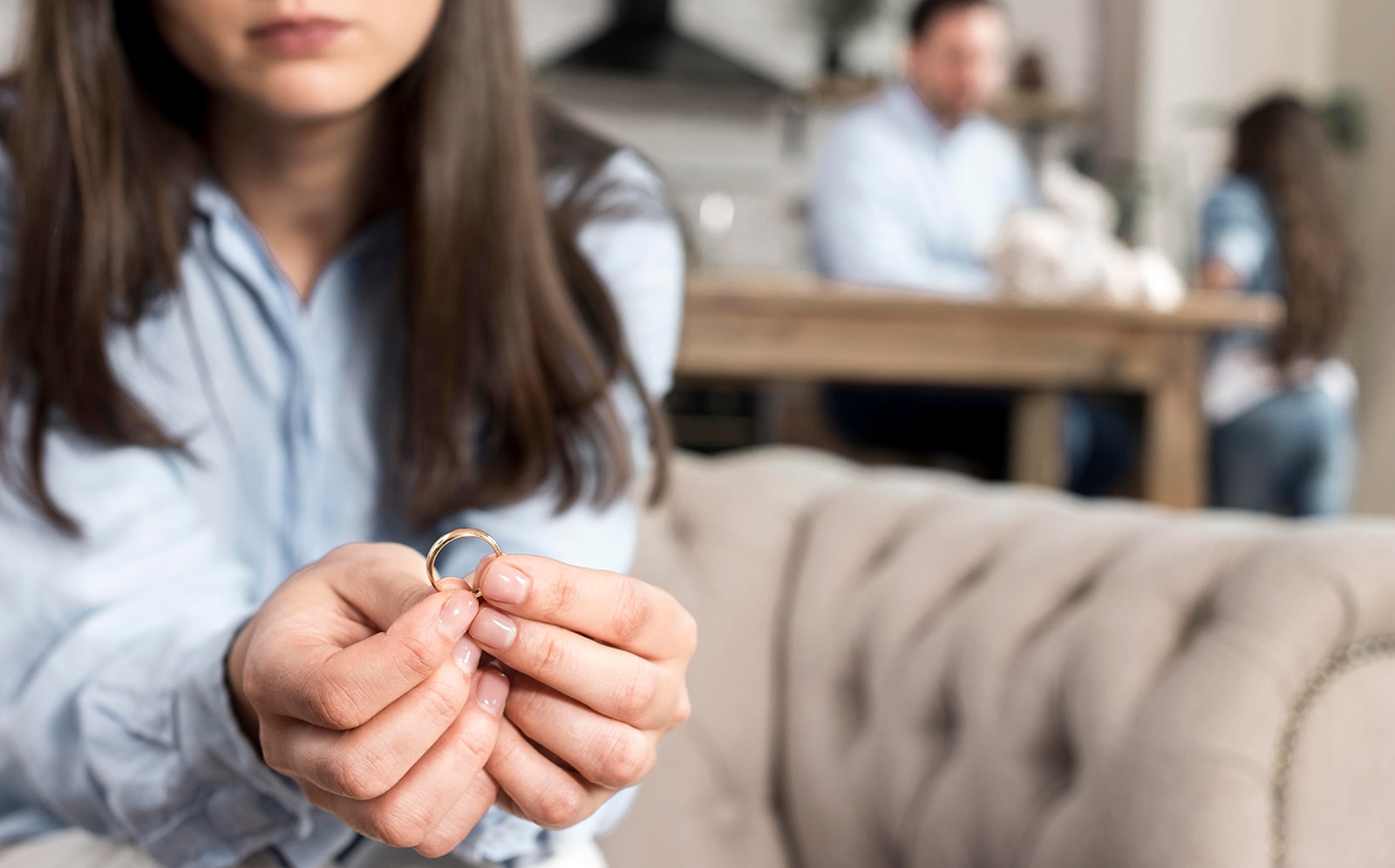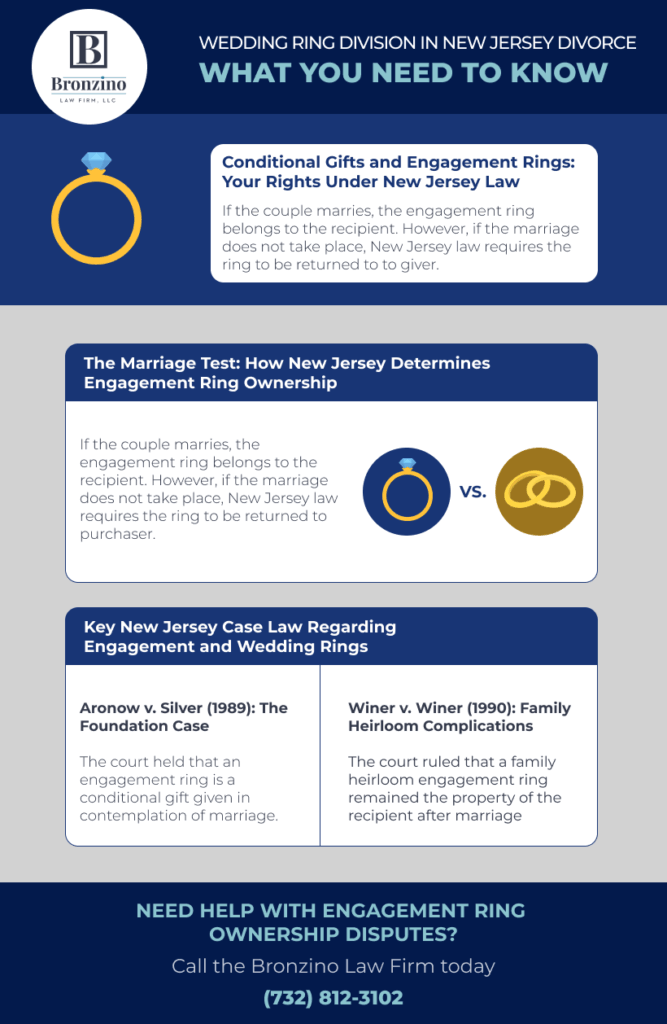Wedding Ring Division in New Jersey Divorce: What You Need to Know
 You are sitting at the kitchen table, looking over some photos, and glancing over at your engagement ring, wondering if you will keep it or need to return it. You and your partner have broken up, leaving you at an irrevocable impasse as your wedding plans go up in smoke. Deciding what to do with jewelry tied to a marriage can be difficult from both an emotional and financial standpoint. The questions come quickly: Who gets to keep the engagement ring if the wedding never takes place? What are the legal options? In New Jersey, engagement rings are generally viewed as “conditional gifts,” meaning there are specific legal requirements that determine ownership. If the marriage does take place, but later ends in divorce, what happens to the rings is not as straightforward as you may think. Knowing how the state handles these situations is essential to making informed choices and protecting your interests.
You are sitting at the kitchen table, looking over some photos, and glancing over at your engagement ring, wondering if you will keep it or need to return it. You and your partner have broken up, leaving you at an irrevocable impasse as your wedding plans go up in smoke. Deciding what to do with jewelry tied to a marriage can be difficult from both an emotional and financial standpoint. The questions come quickly: Who gets to keep the engagement ring if the wedding never takes place? What are the legal options? In New Jersey, engagement rings are generally viewed as “conditional gifts,” meaning there are specific legal requirements that determine ownership. If the marriage does take place, but later ends in divorce, what happens to the rings is not as straightforward as you may think. Knowing how the state handles these situations is essential to making informed choices and protecting your interests.
Conditional Gifts and Engagement Rings: Your Rights Under New Jersey Law
Under New Jersey law, an engagement ring is considered a conditional gift. This means it is given with the expectation that the couple will marry. If the wedding does not occur, the condition is not met, and the law typically requires the ring to be returned to the giver. In recent years, most states, such as Florida, Iowa, Kansas, New York, and Idaho have passed laws that support this view.
New Jersey takes a no-fault approach to these disputes. It does not matter who ended the engagement or why; fault plays no role in deciding who keeps the ring. This is different from states where courts consider who was responsible for the breakup. A small group of states, such as Alabama, Alaska, Kentucky, New Hampshire, and Massachusetts, base their decisions on the party that ended the relationship or acted in a way that was incongruent with a committed relationship.
In New Jersey, the focus stays strictly on whether the marriage happened. This principle was confirmed in Aronow v. Silver, 233 N.J. Super. 344 (1989), where the court ruled that engagement rings are given “on the condition that the parties get married,” and ownership depends on whether that condition is fulfilled.
The Marriage Test: How New Jersey Determines Engagement Ring Ownership
If the couple marries, the engagement ring belongs to the recipient. The ring is given in contemplation of marriage, and once that has taken place, the condition has been satisfied. The ring, as a gift, is no longer under any conditions. This also means that in the event of a divorce, the engagement ring is not considered marital property as it was given as a gift before the marriage. However, if the marriage does not take place, New Jersey law requires the ring to be returned to the purchaser.
Engagement Rings vs. Wedding Rings: Conditional Gifts vs. Equitable Distribution in New Jersey
Engagement rings and wedding rings are not treated the same way under New Jersey law. An engagement ring is considered a conditional gift. Wedding rings fall under the rules of equitable distribution of the marital assets once the marriage ends because they are usually classified as marital property. Marital assets are those that are obtained during the marriage. Equitable does not always mean that assets are split 50/50. The court will decide a fair division of assets based on many factors.
Key New Jersey Case Law Regarding Engagement and Wedding Rings
Aronow v. Silver (1989): The Foundation Case
Philip Aronow, plaintiff, and Elizabeth Silver, defendant, were engaged to be married. This case set the standard for how New Jersey courts treat engagement rings. The court held that an engagement ring is a conditional gift, given in contemplation of marriage. The reasoning was that the gift is only complete if the marriage takes place. If the wedding is called off, the ring must be returned, regardless of who was at fault for ending the engagement.
A portion of the decision reads, “ An engagement ring is a symbol or pledge of the coming marriage … If the engagement is broken off the ring should be returned since it is a conditional gift… It does not matter who broke the engagement…The important thing is that the gift was conditional and the condition was not fulfilled.” This decision laid the groundwork for all later cases, giving courts a consistent rule to follow in ring disputes.
Winer v. Winer (1990): Family Heirloom Complications
A year after the above decision, the New Jersey courts faced a more complex question. In Winer v. Winer, the engagement ring was a four–carat diamond which had belonged to the husband’s mother.. The husband argued that once the couple married, the ring became part of the marital estate and should be divided with the marital property in the divorce. The court ruled against him stating that the engagement ring, regardless of it being a family heirloom, was a conditional gift to the bride and that the condition was met.
Practical Solutions for New Jersey Engagement and Wedding Ring Disputes
An engagement ring given in contemplation of marriage returns to the purchaser if the marriage does not take place, without regard to who broke off the engagement or the reasons why the marriage did not take place. If the recipient of the ring sells it, throws it into the ocean, or otherwise gets rid of the ring, they may be obligated to offer financial compensation to the purchaser. If the couple agrees to sell the ring and share the proceeds, that is a viable solution as long as both parties are on board.
A prenuptial agreement can indicate what is to be done with the engagement and wedding rings in the case of a divorce or ruptured relationship before marriage. This is especially helpful when the rings in question are family heirlooms or part of an inheritance. The ideal solution to keeping Aunt Tilly’s emerald wedding band in the family is to not use it in the first place, but a prenup can ensure it stays with the family. Prenups can be drafted to include wedding and engagement rings. Your attorney can work with you to draft a prenup that will protect your rights and property before you walk down the aisle.

Get Expert Ocean County Legal Guidance: What Should You Do With Your Rings in case of a Divorce?
Deciding what to do with an engagement or wedding ring after divorce is rarely simple. They are more than just jewelry and carry emotional meaning as well as financial value. New Jersey law treats them differently depending on timing and circumstance. In New Jersey, an engagement ring is considered a conditional gift, which belongs to the wearer only once the marriage occurs. Wedding rings, on the other hand, are exchanged during marriage and can be classified as marital property subject to equitable distribution.
While the law provides clear rules, the personal decisions about whether to keep, sell, or repurpose rings are often just as important. It is essential to understand your rights under New Jersey law before making decisions about valuable or sentimental jewelry. In more complex situations, such as when heirloom rings are involved, professional legal guidance can provide clarity and help protect your interests.
A seasoned, compassionate attorney at our law office in Ocean and Monmouth County can guide you through the many difficult decisions you will have to make during your divorce. The Bronzino Law Firm is ready to advise you on your next steps. Whether it is to draft a prenuptial agreement to protect your interests, including what is to be done with the engagement and wedding rings, or to reach an agreement during your divorce. Taking time to understand both the legal and emotional aspects will help you make the choice that feels right for your future. If you have questions and would like a consultation, call us today at (732) 812-3102 or reach out to us online.








